Islam

Religion is increasingly viewed as highly politicized, not least due to the way that it is frequently covered in the news. Numerous studies have shown that news stories with emotional cues tend to both gain audience attention and prolong audience engagement.
It may therefore come as no surprise that online debates about religion are packed with emotional cues that evoke strong reactions from those who participate in them. This sets the stage for passionate online debates.
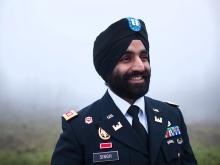
New Army regulations will allow soldiers to wear turbans, beards and hijabs under most circumstances, reflecting a change Sikhs have sought for years.
“Based on the successful examples of Soldiers currently serving with these accommodations, I have determined that brigade-level commanders may approve requests for these accommodations,” wrote Secretary of the Army Eric K. Fanning in a Tuesday (Jan. 3) memo.
In March, the Army concluded that permitting beards for medical reasons but banning them for religious reasons is a discriminatory bar to service for Sikhs, who are forbidden by their faith to cut their hair and beards.
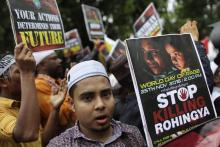
Although they have lived in the country of Myanmar for generations, the country refuses to see them as citizens. They are often seen as intruders from Bangladesh. Treatment of the group varies from violent to genocidal with many, including The Aleteia, claiming that the Myanmar government is practicing a form of ethnic cleansing.
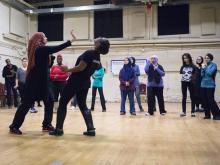
Melissa Grajek was subjected to all kinds of taunts for wearing the hijab, but an incident at San Marcos’ (Calif.) Discovery Lake sealed the deal.
Her 1-year-old son was playing with another boy when an irate father saw her and whisked his son away, telling Grajek: “I can’t wait until Trump is president, because he’ll send you back to where you came from.”
The man then scooped up a handful of wood chips and threw them at Grajek’s son.

Pwint Phyu Latt is a Muslim peace activist in Burma who sought to promote interfaith relations with Buddhists, the nation’s religious majority. She was sentenced this year to two years in prison and two more years of hard labor.
Gulmira Imin is a Uighur Muslim in China who led the 2009 Uighur protests against its communist government. She has been in prison ever since.
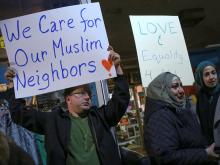
The American Civil Liberties Union collected more than $11 million and 150,000 new members. The Southern Poverty Law Center’s Twitter account gained 9,000 followers. And the Anti-Defamation League, which fights anti-Semitism and other bigotries, saw donations increase fiftyfold.
In the days since Donald Trump won the presidency, these spikes, in support for groups that defend religious and other minorities, speak to a fear that the president-elect will trample on their rights — or at least empower those who would.

While Americans watch Hillary Clinton and Donald Trump fighting to the finish, in a noisy and polarized campaign, Germans are quietly debating their own presidential election in far different terms.
Among the names put forward as candidates are two leading Protestant bishops — one of them a woman — and even a respected Muslim writer.
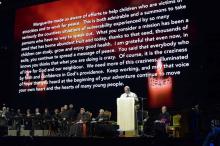
Even by this pope’s standards it was a bold move.
Francis, the spiritual leader of more than a billion Roman Catholics across the globe, this week traveled to Sweden, one of the most secularized countries in Europe, to take part in events marking 500 years since Martin Luther kickstarted the Protestant Reformation.
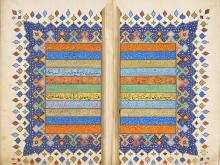
The exhibit is not intended as commentary on today’s politics, its organizers said. Work started on the project six years ago, before sharp rises in Islamophobic rhetoric and violence in the U.S. and Europe, and before Muslim immigration and culture became a flashpoint in American and European politics.
But the Smithsonian is not sorry for the timing, and hopes the exhibit can help quell fears of Islam and its followers.
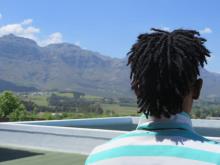
Amazigh was one of 125 queer Muslim activists and allies who came together for The Inner Circle’s seven-day Annual International Retreat, from Oct. 14 to Oct. 21, in South Africa. The gathering focused on “building a movement towards an all-inclusive and compassion-centered Islam,” a mammoth task for attendees like Amazigh who live in countries where homosexuality and transgender expression are often taboo and criminalized.

The members had no idea that word of their efforts to start the Islamic Center of Nashville had reached Yusuf Islam, the famous British musician and Muslim convert also known as Cat Stevens, until his check arrived in the mail.
“I was thinking, ‘What a miracle,’” said Elberry, who was a Vanderbilt University graduate student from Egypt at the time.

The study comes in the same year that Larycia Hawkins — Wheaton College’s first black, female professor to receive tenure — parted ways with the evangelical flagship school after she posted on Facebook that both Christians and Muslims worship the “same God.” The controversy stirred fresh debate among evangelicals about whether all religions worship the same God, and whether God accepts the worship of all religions.

In Jerusalem, Boehm said, there was a “very thin membrane” between the earthly and metaphysical.
That porousness is the origin of all the show’s marvelous art and of many of the city’s troubles, past and present. Almost lost on one wall of the show is a photograph of a glorious pulpit that stood in the Al-Aqsa Mosque from 1188 until 1969, when a delusional Australian torched it. He was trying to destroy the mosque so that the temple could be rebuilt to facilitate Jesus’ return.
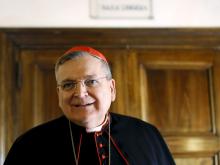
Amid heightened tensions over ISIS-fueled terror attacks and anti-Muslim rhetoric, a prominent U.S. cardinal says Islam “wants to govern the world” and Americans must decide if they are going to reassert “the Christian origin of our own nation” in order to avoid that fate.
Cardinal Raymond Burke, a Rome-based prelate known as an outspoken conservative and critic of Pope Francis’ reformist approach, said in an interview on July 20 that Islam is “fundamentally a form of government.”
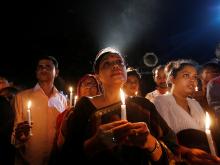
A vortex of hatred is sweeping across the globe, from a nightclub in Orlando to an airport in Istanbul to a restaurant in Dhaka.
At its center are individuals who wrap their savagery in the cloak of Islam. But these terrorists — perhaps 50,000 to 100,000 of the world’s 1.6 billion Muslims — are a perversion of the faith. They do not represent the Islam beloved by moderates like me.
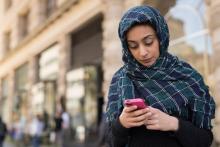
When Laila Alawa woke up on a recent morning, her phone wouldn’t stop pinging with Twitter notifications.
“You’re not American, you’re a terrorist sympathizer immigrant that nobody in America wants and for good reason,” one user tweeted.
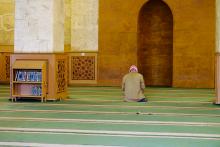
A Muslim civil rights organization says that a record number of groups are spreading hatred of Muslims and have raised more than $200 million in funding since 2008.
The Council on American-Islamic Relations, a Muslim advocacy group, issued its findings in a report conducted with the Center for Race and Gender at the University of California, Berkeley, released June 20.

Tragedies like the June 12 Orlando shooting seem to happen like clockwork, with the U.S. now averaging one mass shooting every day. And in cases where the shooter has a Muslim-sounding name, terms like “terrorist,” “extremist,” “radical,” joined with “Islam” quickly appear.
President Obama took a swipe at the use of such terms earlier this week. In response to Donald Trump’s accusation that he has an ulterior motive in avoiding the term “radical Islam,” the president said the term was “a political distraction.”

As one of a tiny number of openly gay imams in the world, Daayiee Abdullah has felt the sting of rebuke from fellow Muslims. No good Muslim can be gay, they say. And traditional schools of Islamic law consider homosexuality a grave sin.
But Abdullah, a Washington, D.C. lawyer who studied Islam in the Middle East, says that mainstream Islamic teaching on gays must change.
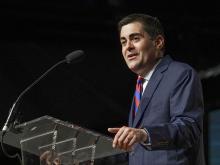
Southern Baptists are usually the first to defend religious freedom. But when it comes to Muslims, some want to draw a line.
At their annual meeting in St. Louis, an Arkansas pastor said Baptists shouldn’t support the right of Muslims to build mosques, especially “when these people threaten our very way of existence as Christians and Americans.”